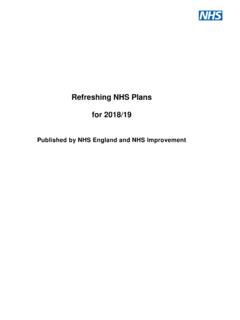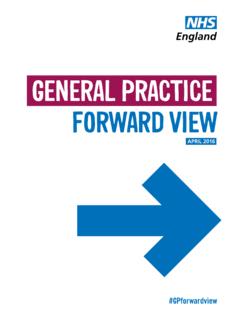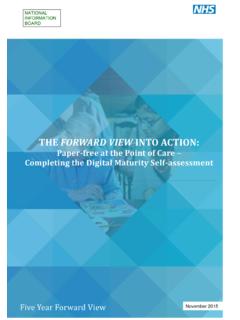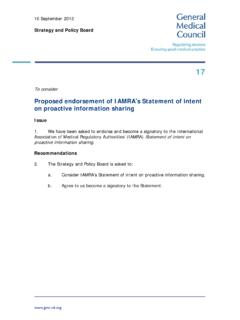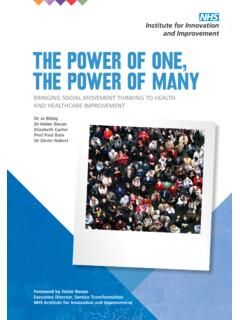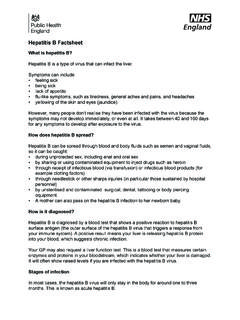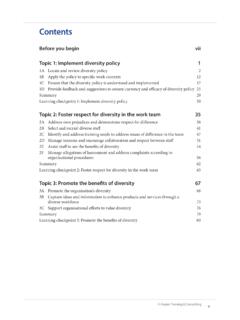Transcription of ‘Culture of Care’ Barometer
1 culture of Care BarometerReport to NHS England on the development and validation of an instrument to measure culture of Care in NHS Trusts Authors: Anne Marie Rafferty Julia Philippou Joanne M Fitzpatrick Jane Ball March 20152 culture of Care Barometer Report 20152 culture of Care Barometer Report 2015 AcknowledgementsWe would like to thank all those who contributed to this work, particularly the staff who took part in the survey at the pilot sites and those who engaged in the focus groups. Thanks also go to the senior staff in both Trusts for liaising with researchers over the use of the culture of Care Barometer amongst staff: assisting with the setting up of discussion groups, distribution of the survey and providing background data on the structure and staffing numbers within the Trust.
2 We also acknowledge the role of the Passionate About Care Today PACT group (Baroness Audrey Emerton, Professor Dame Elizabeth Fradd, Professor Tricia Hart, Sir Stephen Moss, Flo Panel Coates, Professor Anne Marie Rafferty ) in creating the prototype Barometer upon which this work is based and for their time and insights throughout the subsequent development and piloting process. We are grateful to NHS England for funding the project and to the support and insights provided by the Steering Group for the project: Caroline Alexander, Bronagh Scott, Flo Panel Coates, Yvonne Coghill, Sylvia Tang, Virginia Minogue, Paul Taylor and Nigel Research undertook all the survey administration and data processing. Thanks to Geoff Pike for all his help with managing the survey and assisting with analyses.
3 The National Nursing Research Unit (NNRU) received funding from NHS London and NHS England to support the development and validation of the Barometer and reporting. This is an independent report prepared by the NNRU at the Florence Nightingale Faculty of Nursing and Midwifery, King s College London. Contact address for further information: National Nursing Research Unit Florence Nightingale Faculty of Nursing and Midwifery King s College London James Clerk Maxwell Building 57 Waterloo Road London SE1 8WA Email: NNRU website: Florence Nightingale Faculty of Nursing and Midwifery website: culture of Care Barometer Report 2015 3 Foreword 4 Executive Summary 61. Introduction 12 Background 12 Inception of the culture of Care Barometer 13 Research design and project overview 15 Structure of the report 152.
4 culture of Care in theory 16 culture and the NHS 17 organisational culture 18 culture of care 20 Approaches to measuring culture 22 Summary 243. Instrument development and validation 25 Approach 26 Empirical assessment of the culture of Care Barometer 30 Response 31 Profile of the pilot sites 31 Profile of respondents 34 Results 374. Review of the Barometer 51 Identification of themes through Factor Analysis 51 The value and usefulness of the Barometer to participants 585. Implications for practice and next steps 62 The focus of the study 62 A culture of Care Barometer : Lessons learned 63 Key messages 66 Recommendations 67 Next steps 68 References 69 Appendix 1: culture of Care Barometer v2 (revised, as tested in phase 2) 71 Appendix 2: culture of Care Barometer v1 (as tested in phase 1) 73 Contents4 culture of Care Barometer Report 2015 ForewordCompassion in Practice, the national strategy for nurses, midwives and care staff, was launched in December 2012.
5 Since that time a significant programme of work, through six action areas, has created a momentum across the country which has recognised the crucial role that organisational culture plays in determining the experience of patients, users of our services, and staff. The national Compassion in Practice strategy has at its core the values of the 6Cs: care, compassion, competence, communication, courage and commitment. All are interlinked and all are underpinned by the culture in organisations. In November 2014, NHS England published Building and Strengthening Leadership Leading with Compassion in response to a call to action to put compassion at the centre of how care is delivered and led. This built on previous work to support the inextricable links between patient experience and staff experience, positive experiences are unlikely to happen, one without the other.
6 It goes on to highlight the challenge for the system to create environments where compassion can thrive. The authors also assert that culture at organisational level has the potential to trump other determinants of whether compassion will recent years, a number of reports have been published that have cast the spotlight on the quality of care patients have experienced. More often than not these reports have been negative and have highlighted failings in our systems, many of which can be attributed to the culture of care in organisations. These reports do not make comfortable reading and, in the majority of cases, the failings and the negative impact on patients and staff could have been prevented. The lack of a consistent culture of care and compassion can impede the spread of good practice across organisations and result in devastating experiences for patients, their loved ones and the staff caring for of Care Barometer Report 2015 5 The culture of Care Barometer report was developed from the early discussions of a group of professionals, carers and managers, who were so perturbed by the failings at Mid Staffordshire Hospital that they were determined to explore what could be done to improve the quality of care for patients.
7 As a result, the first early blueprint of a tool to measure the culture in care organisations was developed. In April 2014, NHS England under my leadership and through the Chief Nurse for London, Caroline Alexander, commissioned the further development of this blueprint along with a detailed report and literature review. This has resulted in the culture of Care Barometer , a tool unique in its form, and cultivated from the care environment and care staff. This report and the culture of Care Barometer are long awaited and highly anticipated by care providers and commissioners. It is my expectation that organisations will embrace the report and the tool and use it to engage their staff and patients in talking about the culture of care in their organisations.
8 The aim of these conversations must be to ensure that staff can provide good care to patients, patients have a good experience of their care episode, and staff feel valued and satisfied that they are able to raise their concerns when report was authored by Anne Marie Rafferty, Professor of Nursing Policy at King s College London, and has been endorsed by the organisations who participated in the pilot. I would like to take this opportunity to thank Anne Marie, the nurse leaders who first developed the idea of the culture of Care Barometer , and all those who have piloted and provided feedback on its hope you will read and share this report and its Barometer widely with your Board, your colleagues and among all staff working within your organisations.
9 I hope that you will use this tool to encourage and support the meaningful and courageous conversations that will allow us as a nation to promise that the failings at the Mid Staffordshire Hospital NHS Foundation Trust, Morecambe Bay Foundation Trust and other organisations will not happen Cummings Chief Nursing Officer England6 culture of Care Barometer Report 2015 Executive SummaryBackgroundThe healthcare agenda over recent years has been dominated by quick fix solutions. As a result, both the complexity of issues involved and the amount of time it takes for real and enduring change to occur have been underestimated. Consequently, the little things that define the quality of the environment in which patients receive care and in which staff provide that care have been subordinated to more pressing priorities.
10 Learning from high profile crises in care delivery indicates that quality and culture are not uniform within let alone across organisations. This was evident in the description and analysis of events (and the context to those events) at Mid Staffordshire NHS Trust, described by the Robert Francis Inquiry. Pockets of excellence can coexist alongside the worst examples of care failure; lack of consistency in care culture impedes the spread of good practice across organisations. Evidence suggests that major failures are not usually brought to light by the systems for quality assurance or improvement that are part of most healthcare organisations in developed countries - such as incidence reporting, mortality and morbidity reviews, inspections, accreditations, clinical profiling and risk and claim management.

